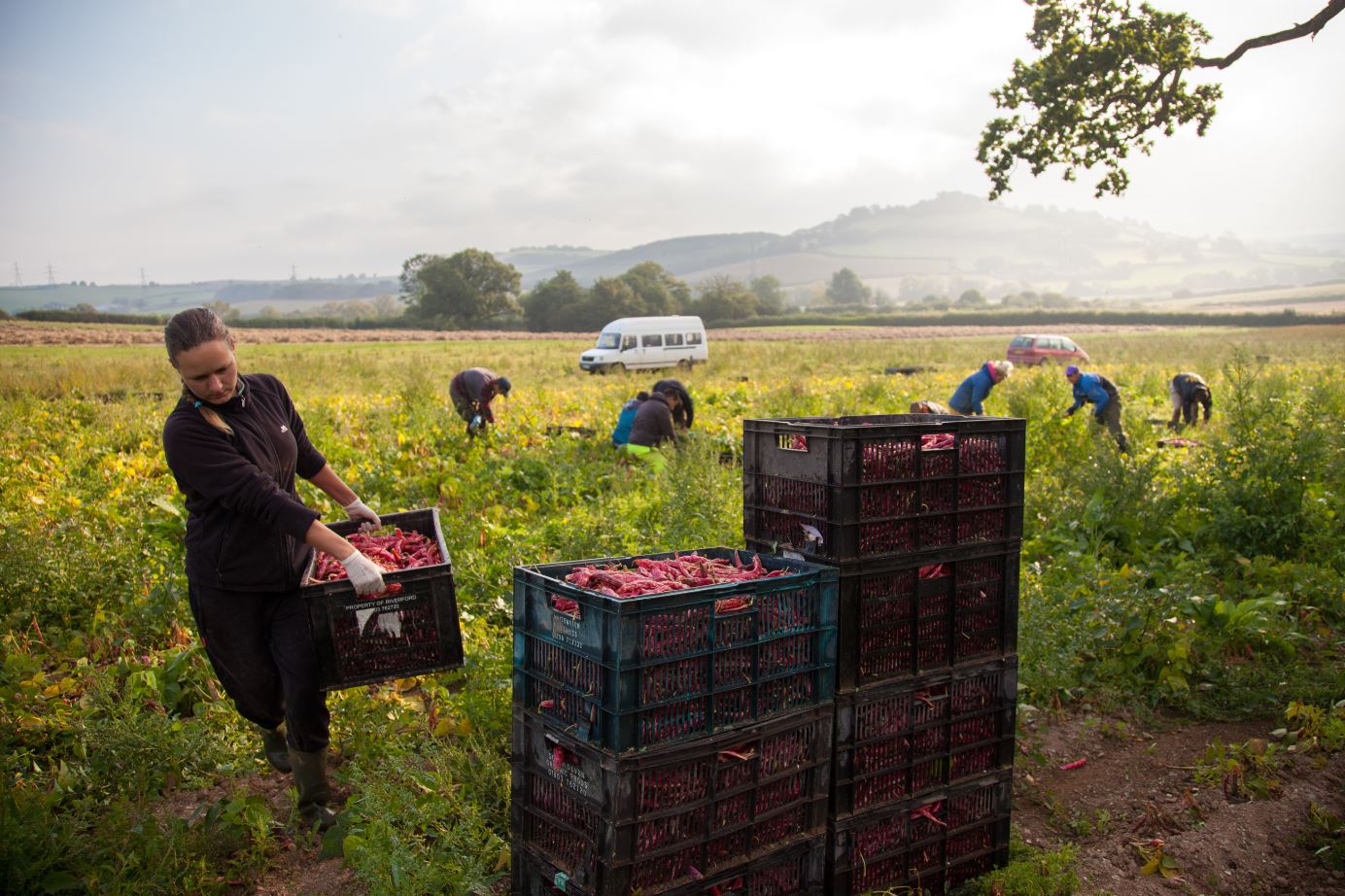British people out of work or facing income losses due to the coronavirus outbreak are being urged to apply for jobs on farms ahead of a huge anticipated shortage of European pickers.
Over 9,000 people have answered a call from an alliance of labour providers to the fresh produce sector urging Brits to apply for paid work on farms, while individual suppliers of salad, berries and organic vegetables have begun their own campaigns.
The UK’s biggest salad grower, G’s Fresh, has launched a national recruitment drive called ‘Feed our Nation’ for 2,500 jobs on its farms in Cambridgeshire, East Anglia and West Sussex, after seasonal workers from Central Europe, many of whom return every year, were unable to travel.
The company is appealing to those who may have lost jobs or income due to coronavirus, hospitality workers where restaurants, pubs and bars have closed, as well as school leavers or university students. Jobs include tractor drivers, field workers and engineers, and pay is around £400 a week plus piece work for some roles.
“Every day we’re expecting the borders to close. We’re already facing challenges bringing people over from Romania and Bulgaria,” said HR director, Beverly Dixon. “Like many businesses, we were looking at putting on planes, but people don’t necessarily want to get on them. And they’re looking at the news and seeing the UK is getting worse.
“Our season doesn’t start until 22 April, when we will start picking radish and lettuce, followed by celery and beetroot. The government are rightly focusing on today and tomorrow – this is an issue that is going to hit us at the end of next month.”

The UK’s fresh produce industry requires around 70,000 seasonal workers a year to help pick seasonal fruit and veg, many of which begin to come into season at the end of next month.
Currently many growers are busy planting for the new season, as well as picking the last of the winter crops, which have had an season extended due to recent warm temperature.
“We’re not slowing down on planting. If anything, we’re looking at where we can plant more. If people aren’t going to be going on holiday in July and August there could be a stronger demand,” said Dixon.
Since launching its campaign on BBC lunchtime news, Dixon said the company’s inbox had been filled and “the phones have started ringing”.
In Devon, organic veg box company Riverford is preparing for the start of the English growing season when it would usually take on around 50 extra seasonal workers. The company also buys from a network of organic growers across the UK and Europe.
Ed Scott, Riverford’s harvest and polytunnel manager, said: “We were due 14 experienced, returning seasonal workers over the next two to three weeks: we’re getting one, we think.
“But there are thousands of UK-based workers who have just had their lives turned upside-down.”
Since putting out a seasonal harvest worker job advert, Scott said he has had no shortage of applicants, including many British nationals, but said it is difficult to find those who are suitable, in the right location, and not likely to leave as soon as their jobs return.
“We put out a generic ‘seasonal harvest worker’ job advert which went live on the website on Friday and so far we’ve had 54 applicants,” he said.
“Some are patently unsuitable, some are desperate, some are from Brighton/London/Manchester. Our ‘experienced’ workers are going to be thin on the ground.”
Dixon said G’s, which supplies major supermarkets as well as Riverford, is still relying on some experienced seasonal workers returning who will be able to help train new recruits.
“A lot of people are potentially out of work. We hope that those who may not have considered horticulture as a job may now think again. It’s physical work, it gets you outside, and we are classed as ‘key workers’,” she said.
It has been notoriously difficult to persuade British workers to apply for seasonal work on farms, as a physically-demanding job that is outdoors in often unpredictable weather.
But Dixon said the outbreak of Covid-19 means “all bets are off”. “With the level of unemployment that is currently out there, there are real opportunities for people to get outside, keep fit, and stay in work,” she said.













One of the problems I can see with recruitment is that the worksites are nowhere near where potential workers live. Okay, some farms have caravans and the like, but for some (eg with families or parents to care for) this isn’t suitable.
Hopefully when the crisis is over we’ll get to a point where as a nation we get some serious conversations about urban food growing to the top of the agenda.
I volunteer as part of the Incredible Edible network, and the use of land within a borough is very political, very subject to tribal politics within councils, in both good and bad ways.
As a nation we are going to need to visualise our urban landscapes in a totally different way, if we are going to feed ourselves in the future, in a way that measures success in bio-diversity count rather than GDP.
Good points Mark.
We might visualise rural landscapes in fresh ways too.
Huge, feudally-run Shooting estates, treeless hill farms, large industrialised monoculture prairies became inhospitable to tough, independent smallholders in various waves of Clearance. Cottages were allowed to tumble down and migrant pickers were treated abusively. By the end of WWII and right through the 1950’s, the main seasonal workforce = village women + children off school. Most of these families relocated to town life to escape the hardships and low wages.
Re: learning how to harvest, clean, sort and bunch crops.
Techniques fairly easy to teach anyone in maybe less than a week.
The hard part is stamina.
Winter work is sustained with a stop + high calorie breakfast at around 10.a.m. then work through to finish at 4 p.m with just a cup of tea at 1.pm..
Summer, midday heat is to be avoided. Fruit crops often best picked ASAP after first light. As climate changes so will people’s need for siesta followed by later afternoon chores in the shade.
Thoughtful landowners will plan ahead and plant shade trees and, once more, sheltered shrub-lined lanes, field kitchen facilities.
All sensible stuff but sorry I had to laugh about the sensible landowner planting trees for shade; I don’t disagree btw – but where I farm in Cornwall it’s taken 20 years for trees to get to 10’ high so I ha e to plan well ahead
I don’think the hard physical work is so much a deterrent as getting to the location and above all having to find work outside the harvesting season. It is too difficult to find work or to claim benefits if there is no work available. The risk of taking seasonal work is huge. Brits are not lazier than other nationalities.
I’m an outdoor activities instructor and I have lost an entire seasons work for the foreseeable future. There’s lots of us in the same situation although if things change we are all likely to return to the industry; but maybe we’re an option for the time being. Many resort to seasonal winter work like selling Christmas trees or supermarket work so are used to being flexible, most of us just want to be outside earning money. There are lots of Facebook groups which can be utilised for advertising positions if needed.
You may need to consider PPE clothing for your pickers.
I wonder if there is any interest in in families who are stuck at home coming onto farms and working, I have two teenage children who could do with getting out of the house and we could come along with a tent and work but we probably won’t be productive as more seasoned workers
Interesting thought, Surely that would be unnecessary as it is easier to keep your distance outside with a bit of discipline and also there is a shortage of protection in the hospitals where I think it has to be prioritized, me thinks. Although a simple mask is a statement but a lot of people where I live are wearing woollen scarfs,which are worse than nothing at all all as they they getting moist and will help the spread, according to a doctor.